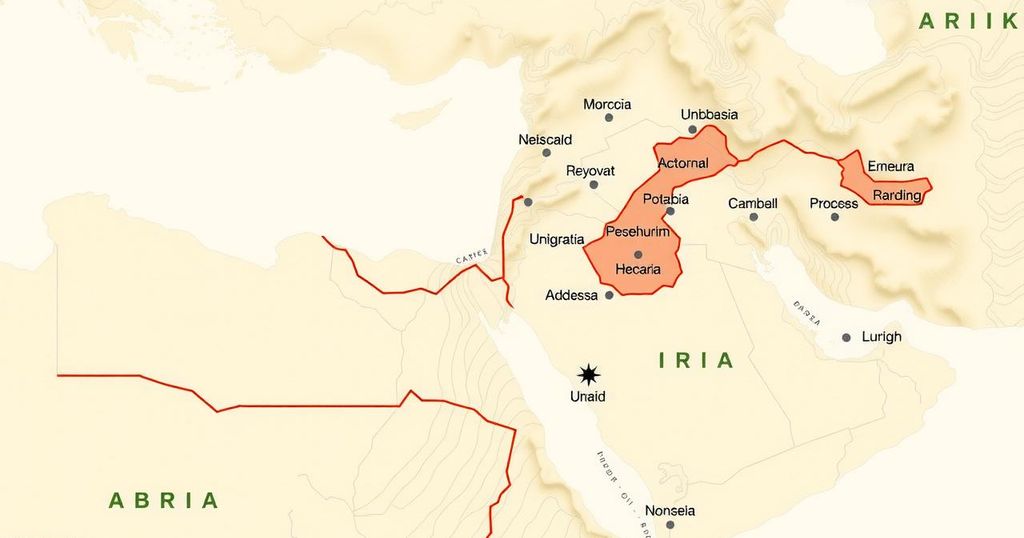Voluntary Land Swaps: A Pathway to Middle Eastern Stability

Opportunities for voluntary land swaps in the Middle East, particularly between Jordan and Israel, could enhance regional stability amid current threats. As Jordan faces new dangers from Iran and extremists, a realignment of borders could fortify its defense and stimulate economic growth. This moment calls for decisive leadership to negotiate beneficial agreements that promote peace.
The Middle East has long been defined by rigid borders that fail to truly serve the countries involved. Recent events, particularly the collapse of Syrian governance, offer a rare opportunity for voluntary land swaps that could foster peace and stability in the region. A significant part of the conversation circles around Jordan, a key US ally, whose geographical and political position has become increasingly precarious amid rising threats from the east and north, particularly Iran and extremist groups.
Historically, Jordan’s borders were established following the French occupation of Syria, which dismantled the short-lived Arab Kingdom. The British then allocated Jordan’s eastern territories to the displaced Hashemites during their imperial interests. In the 20th century, Jordan faced threats primarily from Israel, with which it fought wars in 1948 and 1967. However, the dynamic has shifted; while Israel is now a strategic ally, the threats to Jordan now stem from the east and north.
Jordan’s current leadership is facing troubling developments, such as the rapid downfall of Assad’s regime, aggressive advancements from regional forces, and Turkey’s re-emergence in the geopolitical landscape. These situations compel Jordan to reconsider its borders, potentially swapping its western sections for strategic territories in southern Syria, which would provide a buffer against rising threats from ISIS, Hezbollah, and others.
This swap, if executed, might not only enhance Jordan’s territorial claim but also leverage economic growth, significantly altering its position in the Middle East. By reconnecting the Hashemite kingdom to its roots in southern Syria, Jordan may restore its historical leadership role among Arab nations, while also establishing a safer boundary against hostile forces.
From Israel’s perspective, the matter of Jordanian borders isn’t just about geography; it pertains to national security. The current understanding is that the Jordan River, rather than serving as a secure border, leaves Israel vulnerable to well-armed militaries including those from Iran. If previous incursions into Israeli territory from Gaza demonstrated the insufficiency of fortified borders, then the Jordanian border, lacking similar defenses, is ripe for exploitation.
There exists a historical context here, with the region’s military history highlighting the frequent threats. Rethinking Israel’s defense positioning might involve relocating these lines into eastern Jordan, though this does not need to occur through the contentious measure of land swaps. It could be achieved with Jordanian troops defending from the west and Israeli forces securing the eastern bounds.
Moreover, peace through land swaps possesses the potential to invigorate the economic landscape of both Jordan and Syria. Such developments might allow the desert regions to thrive agriculturally, promote migration of a burgeoning population towards safer areas, and stabilize the region via the construction of new infrastructure and inter-country commitments. A robust economy could deter would-be aggressors and diminish the perceived bullseye on Jordan.
Critically, while the proposal does not directly address the Palestinian issue, it creates a strategic buffer that could reduce hostility toward Palestinian governance in the West Bank. This could lead to more favorable discussions regarding a Palestinian state, autonomy, or some form of decentralization.
For these grand ideas to materialize, negotiations must occur discreetly among authoritative leaders who can navigate the complexities involved. Today’s political climate and the leadership present, notably that of President Trump, resonate with the potential to bring Arab and Israeli leaders together to reconsider long-standing conflicts and find solutions that benefit all parties.
In summary, the potential for voluntary land swaps between Jordan and Israel not only offers the promise of greater security for Jordan in the face of rising external threats, but it could also revitalize the regional economy and enhance Israel’s strategic defenses. The current geopolitical landscape presents a unique moment for leaders, particularly President Trump, to step forward with new diplomatic strategies that may lead to long-lasting peace and regional stability. As the Middle East grapples with its historical conflicts and borders, the concept of mutually beneficial land exchanges may provide a pragmatic path forward.
Original Source: www.jpost.com





